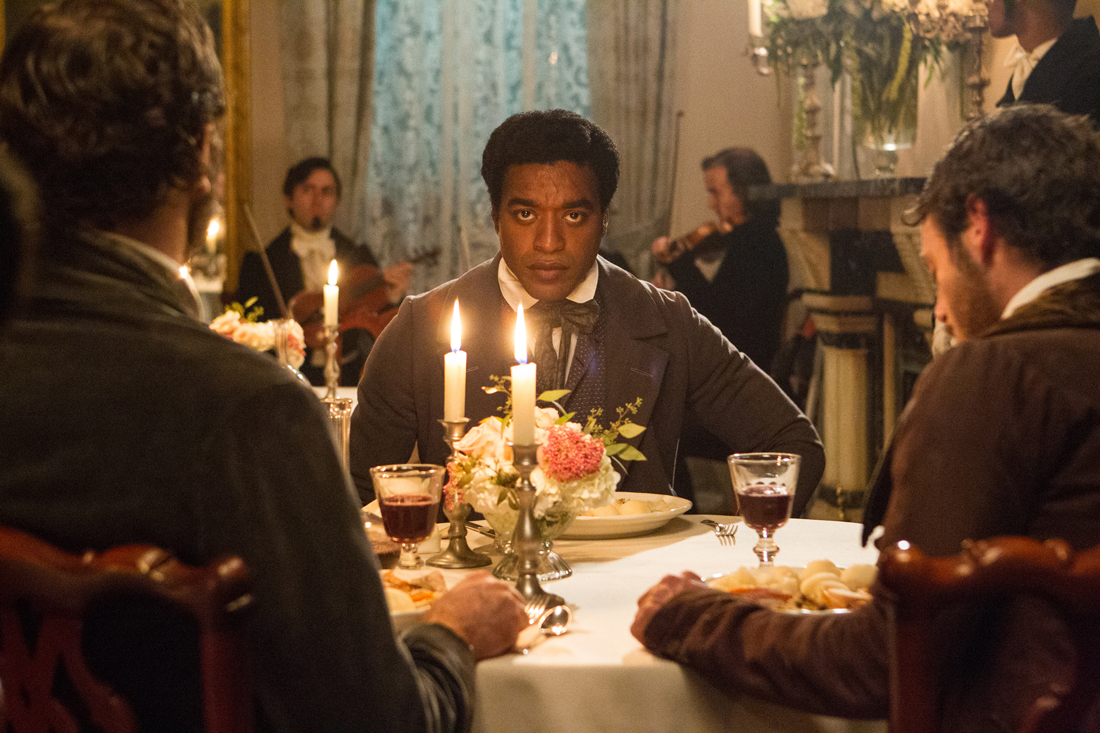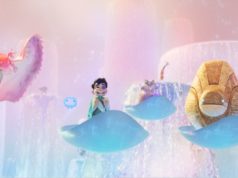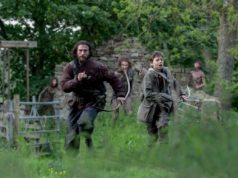Here’s how strong 2013’s movies were: Nebraska, Enough Said, The East, and The Wolf of Wall Street aren’t even cracking my honorable mention list, and they’re really good films. By the same token, the fact that Before Midnight rates only an honorable mention says more about the year than about the qualities of Richard Linklater’s comedy. I notice that a great majority of the year’s best films were made in America, either by homegrown filmmakers or foreign directors. We’re a long way away from six months ago, when everyone (including me) was moaning about the blockbusters clogging up the multiplexes. Plus, the list is topped by two movies about African-Americans, which is fantastic. As always, an asterisk next to a title denotes a film that has not yet been released in North Texas theaters.
1.) 12 Years a Slave. Maybe a foreign filmmaker had to be the one to address slavery in America with the analytical distance that Steve McQueen brought to his overwhelming adaptation of Solomon Northup’s memoir. Yet the English director didn’t just conduct a clinical examination of the social forces that kept slavery in place. He and his cast vividly delineated the twisted things that slavery did to the psyches of both black and white people. This panoramic portrait was seen through the eyes of a free man plunged into this unfamiliar world, and this viewpoint (and Chiwetel Ejiofor’s magnificent performance) made slavery’s injustice and cruelty startlingly fresh. This movie recounts a shameful chapter of American history, and yet the film’s existence and its excellence are reasons to take pride.
2.) Fruitvale Station. We’ve become so used to African-Americans being the victims of gun violence that we’ve grown numb to it, but this terribly sad dramatization of the events leading up to a real-life police shooting in Oakland is made to slap us back to reality. Despite feeling random, the film is rigorously structured and observes its events with a cool equanimity that only heightens the outrage that it depicts. Michael B. Jordan determinedly doesn’t play Oscar Grant as a statistic, a saint, or a symbol, but as a flawed guy with hopes and dreams. Astonishing in its maturity and control, Ryan Coogler’s debut film turns a senseless death into a work of high tragedy.
3.) Gravity. I can’t remember which critic said you leave this movie unsure about which way is up, but that pretty well sums up the discombobulating power of Alfonso Cuarón’s science-fiction epic. The 3D special effects and the director’s long takes made it possible to track the flight of each piece of debris with crystalline precision, and yet Sandra Bullock’s wrenching turn as the marooned astronaut is what really gave layers of turmoil to this thriller. Manipulative though this occasionally was, it still tapped powerfully into cinema’s unique ability to leave us dumbfounded and overawed.
4.) Blue Is the Warmest Color. This French lesbian romance made by a heterosexual male Muslim director lived up to its hype and caused controversy. Are the movie’s graphic sex scenes necessary to the plot, or are they exploitative and porn-like? (My answer: Yes.) Yet this is all just a sidelight to the real greatness of Abdellatif Kechiche’s film, which lies in coruscating work by lead actresses Léa Seydoux and newcomer Adèle Exarchopoulos (giving the year’s best performance) and in the emotional truth of the scenes when these two women keep their clothes on and navigate the ecstasies and perils of this fraught relationship. This NC-17-rated film never played in Fort Worth, not even at the Modern. Not good, everyone.
5.) Her*. I love Her so much. Spike Jonze defies gravity with this story of a man who falls in love with the disembodied female voice of his smartphone’s operating system. What could have been a glib satire of our dependence on technology instead turns into an exceptional, bittersweet romance. Behind Jonze’s creative and highly plausible depiction of near-future tech is a searching look at the nature of consciousness and emotions. Joaquin Phoenix’s and Scarlett Johansson’s performances are technically amazing, but they also bring serious pain to their confused characters — you will believe that a computer can feel anguish and insecurity in the wake of love. This work of beauty and heartbreak and sexual orientations that don’t exist yet is enough to make you break down and cry.
6.) The Act of Killing. Every time you think this documentary can’t get more appalling, somehow it does. Instead of simply interviewing the leaders of Indonesian death squads about the killings they committed, Joshua Oppenheimer helped these mass murderers (who are now all government workers) re-enact their crimes against humanity as if they were scenes from movies. One guy does a musical number, with scantily clad girls representing his victims dancing around him. Yet as fanciful and tacky as these re-enactments are, they powerfully bring these perpetrators of genocide face-to-face with the horror of what they’ve done. This movie mixes its moral conscience with dazzling creativity.
7.) Frances Ha. Finally, a Noah Baumbach film with a likable main character! Greta Gerwig is helplessly charming in this black-and-white comedy that she co-wrote and stars in as a modern dancer whose best friend and roommate (Mickey Sumner) moves out to get married. Baumbach’s off-kilter rhythms mirror the chaotic nature of Frances’ life, and behind her unattractive behavior, you can sense her confusion and hurt as she ponders the next stage of her life. The movie is set in New York and Paris, and yet it’s an interlude in Sacramento (where Frances visits her parents) that feels like an enchanted fairyland. This coming-of-age saga bubbles with joy, never more so than when Frances turns pirouettes on a Manhattan sidewalk just because she can.
8.) The World’s End. Some alcoholics want to drink themselves to death. In this movie, Simon Pegg is so far gone that he’s willing to drink his friends to death. That’s the bleak underpinning of Edgar Wright’s rapturous sci-fi comedy about a bunch of fat, middle-aged guys fighting in bars with blue-blooded alien robots. This British film is the funniest thing I saw all year, but it also takes on concepts of free will and human nature in the audacious climactic confrontation with the chief alien. Pegg leaks suicidal despair behind his beery bonhomie, and Nick Frost is a revelation in an adult role for once. Let’s raise a glass (but not too many) to this movie’s comedic brilliance.
9.) Beyond the Hills. Romania’s cinematic flowering continues with this drama about two women who grew up together in an orphanage. Are they a lesbian couple or just close friends? Writer-director Cristian Mungiu leaves that open, but when one woman decides to join a convent, her partner acts out in ways that bespeak either frustrated love or violent schizophrenia. That’s when this film turns into a harrowing exorcism drama, as the priest in charge of the convent tries to drive Satan out of her. With almost everything filmed in medium shot, Mungiu’s sense of composition is almost as masterful as his ability to spool out this unbearably tense tale. Horrifyingly, the events in this movie were based on a real-life incident.
10.) (tie) American Hustle and A Touch of Sin. What do a funny, period American caper flick and a violent, contemporary Chinese thriller have in common? They’re both about ordinary people who recognize that when the economy is rigged in favor of other people, hard work means absolutely nothing. Capitalism is very different in America and China, and yet the unequal opportunities afforded by these societies lead the characters here to the same sort of desperation and corruption. David O. Russell’s film brings great acting and moments of sheer ecstasy. Jia Zhangke’s film applies a slow, tight grip to its four loosely connected stories. If you want to assess the state of the world’s economy in 2013, you could do worse than watch these two films.
Honorable mentions: Jean-Marc Vallée’s unsentimental, compassionate AIDS drama Dallas Buyers Club; François Ozon’s house-of-mirrors literary comedy In the House; Seth Rogen and Evan Goldberg’s uproarious self-satire This Is the End; Richard Linklater’s vitriolic and sweet marital comedy Before Midnight; Baz Luhrmann’s eye-popping extravaganza The Great Gatsby; Clio Barnard’s hard-edged British industrial fairy tale The Selfish Giant*; James Ponsoldt’s delicate, sharply observed study of high-school alcoholism The Spectacular Now; Pablo Larrain’s hilarious tale of an adman taking on a dictator No; Chris Buck and Jennifer Lee’s subversive Disney musical Frozen; Hayao Miyazaki’s meditation on mortality and airplane parts The Wind Rises*; Ron Howard’s complex, layered auto-racing epic Rush; Ben Wheatley’s sick, depraved road-trip comedy Sightseers; Joss Whedon’s joyous Shakespeare home movie Much Ado About Nothing; David Lowery’s backwoods romantic tragedy Ain’t Them Bodies Saints; and Destin Cretton’s crushing, exhilarating foster-home drama Short Term 12.













Let’s just admit that it was a terrible and desolate year for films and that some of the most iconic artistic presences in our culture passed away this year –with no similar talents in sight .
(I really could not summon up enough interest to see anything on your list except for the overrated “Gravity” –a total bore on reflection). Too bad that “Blue Jasmine” and “American Hustle” did not merit your mention, and/or a higher rating.
So you didn’t see any movies this year, but you know they were all horrible? Damn, I wish I was psychic like that. It would save me a lot of trips to the theater.
Actually, I was referring to YOUR list of “must see” films and their ratings. I thought “Blue Jasmine” was good (you didn’t mention it) and “American Hustle” was interesting-with good dialogue(should have been rated higher) “In The House”-French also had great dialogue and was intriguing. Gravity was fairly dull. The rest of your picks dealing with slavery,victims killed by cops, alcoholism, mass murder, a guy in love with his smart phone (???), are just too depressing.
I take your point, but truly great films are never depressing no matter how grim their subject matter might be. Indeed, I feel exhilarated by great tragedy, and some of these films handle their subjects with a lot of humor. (or, in the case of “The World’s End,” with lots of humor and martial-arts sequences, if that does anything for you.) The only truly depressing movies are bad ones.
If you’re looking for something light and fun, I’d recommend “Frances Ha” and “This Is the End.”
Actually, the subject of “Blue Jasmine” is pretty grim, too, when you come right down to it. It’s just that it feels lighter because Woody Allen photographs it like one of his comedies and because he has such an eye for the beauties of San Francisco.
Movies are so expensive now–BTW it pays to read about the film before you see it. I did see far fewer films this year than last, simply because the subject matter of most was so unappealing. I stand by my impression that it was a miserable year for films
world’s end does not belong on this list. . . worth watching, but thinly disguised, same-ol Pegg buddy bloke shenanigans–see Shaun of the Dead, Hot Fuzz, bloody blahh blahh blahh. Paul was better a few years back and, speaking of back, The Way Way Back is vastly superior and less hokey.